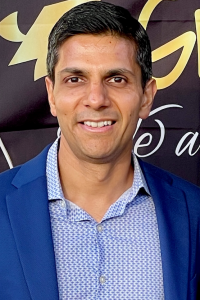coordinator's message

For Hindu parents, the first 10 years of a child’s upbringing are all about, lot of in-school and out-school activities, and ton of good food, love and care. As the child enters sixth or seventh grade, negative portrayals of India and Hinduism in Social studies or World History through school textbooks are commonly known. Most kids absorb these cultural attacks on their face value, and do not even discuss these topics like cultural backwardness or malpractices tied to Hinduism, poverty, caste-based oppression, and so on at home, just due to their sheer respect towards their parents. But they also do not want to be identified as a Hindu or an Indian, for the same reasons. On the other hand, parents are unable to handle this problem as the child grows through adolescence, facing a existential question, whether to be proud of their Indian heritage and Hindu roots, or be dismissive about it. The parents are either un-equipped with reasoning or information, or partly believe into the Western narratives of Aryan invasion, or non-affiliation with an Hindu or an Indian value system, a sign of evolution.
A shaky cultural background, that is at best confined to Indian food, Indian cinema, or acquaintance with family members back in India, later “converts” these growing children into young adults, who are willing to compromise most customs, traditions or even connections they were born with, in pursuit of a western lifestyle, that ultimately dissolves their cultural roots and their identity as a Hindu. Parents continue to watch this transition silently, conceding it to be the wish of their dear children and hoping that the children will not drift away further, as they grow family units of their own.
Rewind back 20 years, what would the parent have done different, given a choice? Most parents say – that they would give their children an understanding of the Indian culture and Hindu Dharma, as early as their elementary school life, so a foundation was not missed. While time, just like water cannot be turned back once flown, it can be guided to follow a course, when flowing. That is exactly the choice we parents get to make, when we have children between 4-18 years of age; to give them a balanced diet of cultural nurturing just like we do for their physiological upbringing.
Vidya Vikas School, is the one-stop solution, a Sunday school, that caters to your needs as a parent, and for your child’s needs as a learner. A graded curriculum in Hindu dharma from pre-school to 12th grade, helps create not just awareness, but also an appreciation towards what each educated Hindu brings to the world, in terms of peace, knowledge and harmony. Language programs in 7 different Indian languages or other fine arts, provide a cultural base and connect that not only makes the children multi-lingual, but also helps them with language credits for high-school, if supported by their respective school district. A visit to the temple every Sunday, helps them build memories and a routine that helps build a network of friends that go for life. Whether it’s enjoying a vegetarian lunch prasad after prayers, or witnessing festival celebrations first-hand at the temple, it creates a level of comfort of having Indian and/or Hindu roots, that most parents grew up with. Children develop critical thinking when learning basic concepts of Sanātana dharma in an unbiased way, often with presentation or leadership skills, or simply a well-rounded confident personality, fully integrated with their roots. As they say, the deeper the roots, the greater the fruits.
The Vidya Vikas school, operating as the educational arm of the Ekta Mandir in Irving, welcomes you to join us, regardless whether you just found out about this program, or decided to join at a later age for other reasons.
Namaste and Kind regards,
Abhishek Bansal
Vidya Vikas Co-ordinator
